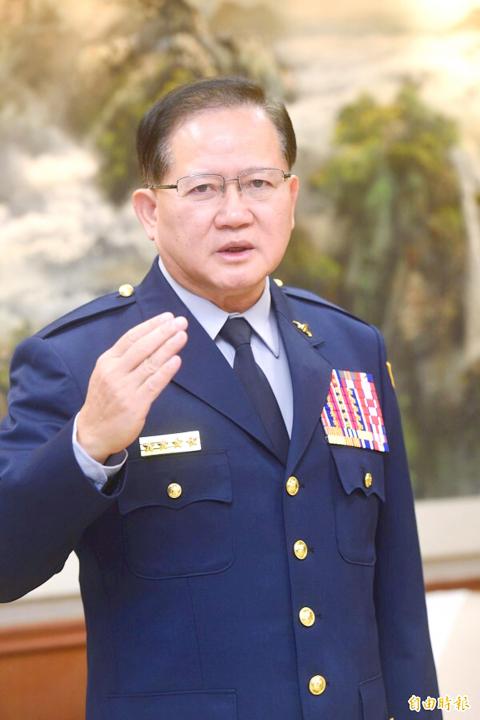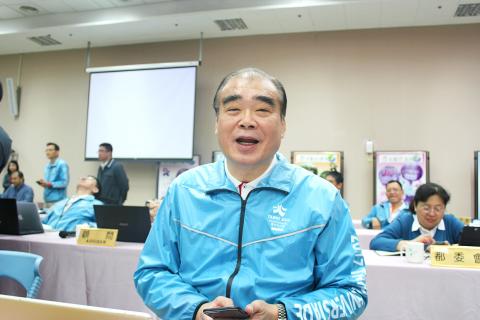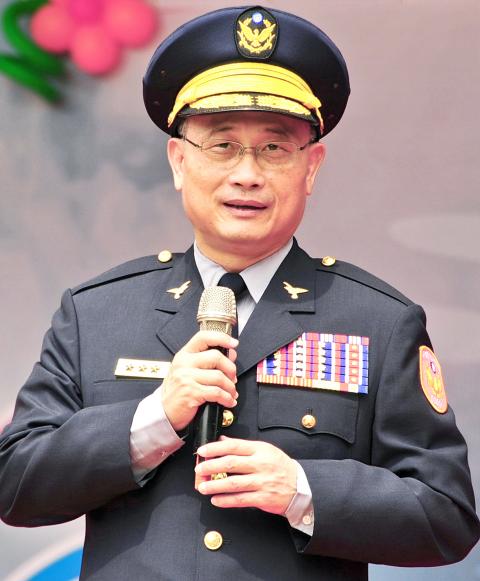A major reshuffle of high-ranking police officials on Tuesday took many by surprise, with several legislators saying it was a slap in the face for Taipei Mayor Ko Wen-je (柯文哲).
The Ministry of the Interior announced the reshuffle on Tuesday night, promoting Kaohsiung Police Department Commissioner Chen Chia-chin (陳家欽) to head the National Police Agency (NPA), while Taipei Police Department Commissioner Chiu Feng-kuang (邱豐光) was appointed his deputy.
NPA Director-General Chen Kuo-en (陳國恩) is to become deputy chief of the National Security Bureau.

Photo: Chung Chih-kai, Taipei Times
Taiwan Police College President Ho Ming-chou (何明洲) is to replace Chen Chia-chin as Kaohsiung police chief, while NPA Deputy Director-General Wei Ti-kun (衛悌琨) is to become the college’s new president.
Taichung Police Department Commissioner Chen Jia-chang (陳嘉昌) is to fill the vacancy left by Chiu, while NPA Chief Secretary Yang Yuan-ming (楊源明) is to become the new Taichung police chief.
The handover ceremonies are scheduled to take place today and tomorrow, the ministry said.

Photo: Shen Pei-yao, Taipei Times
Speculation had been rife that Chiu would be replaced as Taipei police chief after security breaches at the Taipei Summer Universiade opening ceremony on Aug. 19 led to protesters breaking police lines and delaying its start.
KMT legislators viewed the reshuffle as further evidence of a falling out between the Democratic Progressive Party (DPP) and Ko, an independent, who joined forces during the last mayoral election.
It is unprecedented for the Kaohsiung police chief to be promoted directly to head the National Police Agency, as they were usually appointed first to Taipei police chief, Chinese Nationalist Party (KMT) caucus deputy secretary-general Tseng Ming-tsung (曾銘宗) said.

Photo: Huang Liang-chieh, Taipei Times
The appointment was politically motivated and a snub by the DPP aimed at Ko, Tseng said.
Kaohsiung Mayor Chen Chu (陳菊) appears to have a great influence on the DPP’s “New Tide” faction and has become the “underground” go-to person for Executive Yuan personnel appointments, KMT Legislator Lee Yen-hsiu (李彥秀) said.
DPP Legislator Hsu Chih-chieh (許智傑) praised the reshuffle, saying Premier William Lai (賴清德) had the courage to “grasp the nettle” of security mismanagement.
Chiu’s transfer was an “obvious demotion” because the NPA deputy directorship is a high-ranking position, but carries little power, Hsu said.
The reshuffle was made to hold officers accountable for the Universiade security breaches, he said.
“The difference between being chief of a local police department and deputy director of the NPA is that in the local [police] department, you are the boss, while at the NPA, you only command a few secretaries,” DPP Legislator Huang We-cher (黃偉哲) said.
People First Party (PFP) Legislator Chen Yi-chieh (陳怡潔) said that the appointment was a sign that the central government was unhappy with police’s handling of protests nationwide.
The move was also a slight against Ko, she said, adding that the relationship between the DPP and Ko would not only affect local elections next year, but also the 2020 presidential election.
While the Ministry of the Interior had the power to appoint and transfer individuals for the NPA, it usually notifies local heads of government before making a move, New Power Party (NPP) Legislator Freddy Lim (林昶佐) said.
This breach of custom might affect interaction and cooperation between the Taipei Police Department and the Taipei City Government, Lim said, adding that the ministry should offer an explanation.
The reshuffle was in part due to the security breaches at the Universiade, which caused a delay in athletes entering the Taipei Municipal Stadium to participate in the opening ceremony, Minister of the Interior Yeh Jiunn-rong (葉俊榮) said on Tuesday.
The incident highlighted weaknesses in national security measures and measures to manage protests in Taipei, Yeh said.
That is why Chen Jia-chang, an expert in protest management and psychology, was chosen to head the Taipei Police Department, he said.
Despite relative stability over the past year, law and order work faces three immediate challenges: the threat of terrorist attacks, Internet fraud and drug-related crime, he added.

SECURITY: As China is ‘reshaping’ Hong Kong’s population, Taiwan must raise the eligibility threshold for applications from Hong Kongers, Chiu Chui-cheng said When Hong Kong and Macau citizens apply for residency in Taiwan, it would be under a new category that includes a “national security observation period,” Mainland Affairs Council (MAC) Minister Chiu Chui-cheng (邱垂正) said yesterday. President William Lai (賴清德) on March 13 announced 17 strategies to counter China’s aggression toward Taiwan, including incorporating national security considerations into the review process for residency applications from Hong Kong and Macau citizens. The situation in Hong Kong is constantly changing, Chiu said to media yesterday on the sidelines of the Taipei Technology Run hosted by the Taipei Neihu Technology Park Development Association. With

CARROT AND STICK: While unrelenting in its military threats, China attracted nearly 40,000 Taiwanese to over 400 business events last year Nearly 40,000 Taiwanese last year joined industry events in China, such as conferences and trade fairs, supported by the Chinese government, a study showed yesterday, as Beijing ramps up a charm offensive toward Taipei alongside military pressure. China has long taken a carrot-and-stick approach to Taiwan, threatening it with the prospect of military action while reaching out to those it believes are amenable to Beijing’s point of view. Taiwanese security officials are wary of what they see as Beijing’s influence campaigns to sway public opinion after Taipei and Beijing gradually resumed travel links halted by the COVID-19 pandemic, but the scale of

A US Marine Corps regiment equipped with Naval Strike Missiles (NSM) is set to participate in the upcoming Balikatan 25 exercise in the Luzon Strait, marking the system’s first-ever deployment in the Philippines. US and Philippine officials have separately confirmed that the Navy Marine Expeditionary Ship Interdiction System (NMESIS) — the mobile launch platform for the Naval Strike Missile — would take part in the joint exercise. The missiles are being deployed to “a strategic first island chain chokepoint” in the waters between Taiwan proper and the Philippines, US-based Naval News reported. “The Luzon Strait and Bashi Channel represent a critical access

Pope Francis is be laid to rest on Saturday after lying in state for three days in St Peter’s Basilica, where the faithful are expected to flock to pay their respects to history’s first Latin American pontiff. The cardinals met yesterday in the Vatican’s synod hall to chart the next steps before a conclave begins to choose Francis’ successor, as condolences poured in from around the world. According to current norms, the conclave must begin between May 5 and 10. The cardinals set the funeral for Saturday at 10am in St Peter’s Square, to be celebrated by the dean of the College